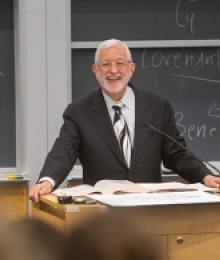S. Science and the Courts
Course Information
- Course Number
- L8600
- Curriculum Level
- Upperclass
- Areas of Study
- Civil Procedure, Litigation, and Dispute Resolution, Criminal Law and Procedure, Intellectual Property and Technology, Interdisciplinary Legal Studies
- Type
- Seminar
Section 001 Information
Instructor
 Jed Rakoff
Adjunct Professor of Law
Jed Rakoff
Adjunct Professor of Law
Section Description
Science plays a huge and ever increasing role in the courts, typified by everything from forensic evidence in criminal cases to global warming disputes in environmental cases to genome patent disputes in intellectual property cases to prescription drug defects in mass tort cases to neuroscientific evidence in death penalty cases, and so on and so forth., This seminar addresses the difficulties that courts encounter in dealing with scientific evidence and scientific concepts, both at the practical level and at the jurisprudential level. Examples will be drawn from recent cases and current controversies An important focus of the seminar will be on how judges, juries, and lawyers untrained in science can best handle scientific issues with which they are presented. In addition, several very prominent scientists will be guest participants in several of the sessions.
No course prerequisite or prior scientific knowledge is required.
Attendance at the first class is mandatory for all registered students and for wait-listed students who wish to be considered for admission to the seminar.
- School Year & Semester
- Fall 2023
- Points
- 2
- Method of Evaluation
- Paper
- J.D Writing Credit?
- Minor (automatic)
- Major (only upon consultation)
Learning Outcomes
- Primary
-
- At the end of the course, students will have acquired understanding of and/or facility in doctrinal analysis, including close reading of cases and precedents, and application to facts
- At the end of the course, students will have acquired understanding of and/or facility in judicial, legislative and/or administrative processes
- At the end of the course, students will have acquired understanding of and/or facility in jurisprudential considerations in legal analysis
- At the end of the course, students will have acquired understanding of and/or facility in the historical development of law and legal institutions
- At the end of the course, students will have acquired understanding of and/or facility in use of other disciplines in the analysis of legal problems and institutions, e.g., philosophy; economics, other social sciences; and cultural studies
- Secondary
-
- At the end of the course, students will have acquired understanding of and/or facility in a specific body of law, including major policy concerns
- At the end of the course, students will have acquired understanding of and/or facility in values-based considerations in law-making
- At the end of the course, students will have acquired understanding of and/or facility in finding, understanding, using and critiquing secondary legal literature
Course Limitations
- Instructor Pre-requisites
- None
- Instructor Co-Requisites
- None
- Requires Permission
- No
- Recommended Courses
- None
- Other Limitations
- Attendance at the first class is mandatory for all registered students and for wait-listed students who wish to be considered for admission to the seminar.